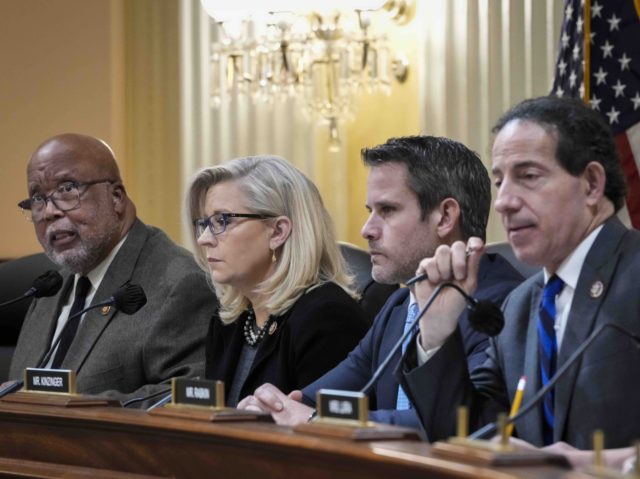The U.S. House of Representatives voted Tuesday for the second time in recent weeks to hold a potential witness at the January 6 committee in contempt of Congress for defying a subpoena — despite having legitimate constitutional objections.
Mark Meadows, a former member of the House and former chief of staff for President Donald Trump, was held in contempt on Tuesday. Former Trump adviser (and former Breitbart News executive chairman) Stephen K. Bannon was also held in contempt last month.
The fact that the Department of Justice (DOJ) chose to file criminal misdemeanor charges against him is not a sign of the validity of the charges, but the continued politicization of the department, despite Biden’s empty promises.
The House has held officials in contempt of Congress before, both for frivolous, political reasons — and for legitimate ones.
In 2019, the House held then-Attorney General William Barr in contempt for refusing to hand over grand jury materials from Special Counsel Robert Mueller’s investigation into phony “Russia collusion” — even though, as Barr repeatedly noted, he was prevented from handing over those materials because of federal statutes that only Congress itself could have changed.
More serious were the contempt charges against former IRS official Lois Lerner, who targeted conservative groups before the 2012 election and then refused to testify before the House. The Department of Justice let her off the hook.
It also declined to prosecute then-Attorney General Eric Holder, after he failed to turn over documents relating to Operation Fast and Furious, in which the Obama Administration had smuggled guns to Mexico that were used to kill Border Patrol Agent Brian Terry.
The contempt referrals by the January 6 committee are without merit. In both cases, Meadows and Bannon are pointing out that they lack constitutional authority to give the House what it wants because Trump has exerted executive privilege.
Both Meadows and Bannon want the courts to decide the limits of Trump’s executive privilege claim. They argue, correctly, that they themselves lack the authority to decide on their own — and they argue that Congress cannot decide the limit, either.
This is not a new problem. In fact, it was at the heart of the first impeachment trial against Trump just last year, when the Democrats tried to remove Trump from office simply because he went to the judiciary to object to a House subpoena aimed at White House counsel.
The Senate — including Mitt Romney (R-UT), who voted to remove Trump on the other charge — declined to convict Trump for that. More recently, the Biden administration agreed to a deal that dropped the dispute entirely.
The same cast of characters from the two impeachments — Reps. Adam Schiff (D-CA) and Jamie Raskin (D-MD) — are trying the same abuse of power, even though both the Senate and the Biden White House have declined to legitimize it.
Moreover, Meadows has an active lawsuit against the January 6 committee that precedes the contempt vote. The lawsuit points out, among other things, that the committee violated the terms of its own enabling resolution. Speaker of the House Nancy Pelosi (D-CA) broke the rules when she rejected Republican picks for the committee, instead appointing two anti-Trump drones, Liz Cheney (R-WY) and Adam Kinzinger (R-IL), playing the part of state witnesses in a Stalinist show trial.
Moreover, Meadows argues convincingly that the committee broke the rules by issuing subpoenas without consulting its ranking member, as required by the House resolution — because there is no ranking member, thanks to Pelosi’s intervention.
These are serious challenges that, if upheld, would invalidate all of the committee’s subpoenas, the House contempt citations, and the DOJ’s malicious prosecution. The Democratic House did not wait for the courts; it abused its power, while it could.
This is no ordinary political struggle. The power that the January 6 committee is trying to claim for itself marks a dangerous intrusion onto civil liberties.
One of the reasons Meadows resisted the subpoena — after cooperating with the committee — is that Schiff, Cheney, and company wanted to force Verizon, his mobile carrier, to hand over all of his phone records. They have no right or reason to demand those records.
If they get them, no American’s personal phone records will ever be safe.
The texts that Meadows gave the committee thus far, which Cheney read aloud on Monday night, make clear that there was no plot by Trump and his allies to mount an “insurrection.”
The Capitol riot was a political mess and a logistical failure — one for which Pelosi shares responsibility, for failing to allow the National Guard to help the Capitol Police. But she is not being forced to testify.
The January 6 committee is an egregious, un-American abuse of power, and it must be stopped, now.
Joel B. Pollak is Senior Editor-at-Large at Breitbart News and the host of Breitbart News Sunday on Sirius XM Patriot on Sunday evenings from 7 p.m. to 10 p.m. ET (4 p.m. to 7 p.m. PT). He is the author of the recent e-book, Neither Free nor Fair: The 2020 U.S. Presidential Election. His recent book, RED NOVEMBER, tells the story of the 2020 Democratic presidential primary from a conservative perspective. He is a winner of the 2018 Robert Novak Journalism Alumni Fellowship. Follow him on Twitter at @joelpollak.

COMMENTS
Please let us know if you're having issues with commenting.